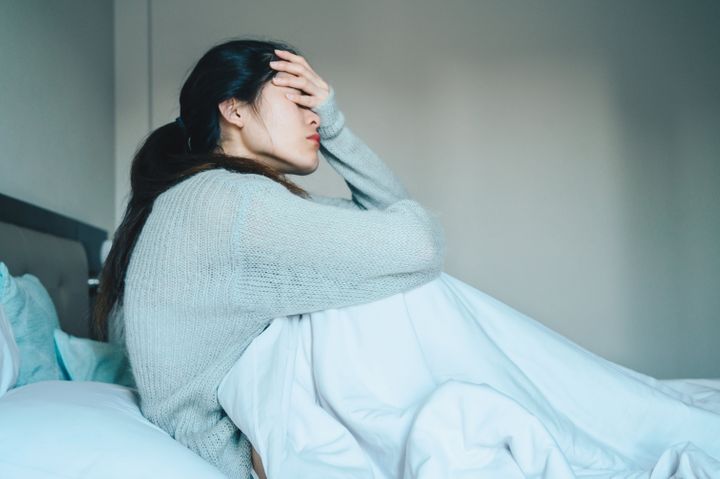News
10 Signs You
We’ve all witnessed the overly simplified depiction of a person with depression as someone who is perpetually mopey, sad and crying, their despair blatant and on display for all to witness. That is not reality.
The truth is that symptoms for depression vary widely, which is why someone can be posting nonstop selfies on Instagram and simultaneously be in the throes of a major depressive episode, no apparent signs of sadness in sight. Meanwhile, another person may exhibit signs of depression by withdrawing from normal activities or sleeping too much, all while showing no outward signs of sadness.
The coronavirus pandemic has led to mental health issues, including depression, among more people. But if you’ve never experienced the condition before, it might be hard to identify if you think it mostly includes feeling sad.
We spoke with a couple of mental health experts to help highlight signs that could indicate depression ― even if sadness isn’t one of them.
You exhibit behaviors that may be associated with ‘pandemic fatigue’
With COVID-19 completely upending our daily lives, it can be easy to dismiss depression as a side effect of dealing with pandemic pressures. Ignoring social distancing measures, going lax on mask ordinances, or changing your punctuality habits or appearance can all be indicators that you’re depressed and not just tired of the pandemic restrictions.
“A lot of us are fatigued by the pandemic and how long it’s been,” said Zamira Castro, a licensed psychologist based in Florida. “There’s pandemic fatigue, and then there’s carelessness or complete disregard for your well-being. That could be a slippery slope. Someone in your life who’s loosening their COVID restrictions, you may wonder is this because they’re really tired and they’re trying to manage their risks and play with what they can or can’t, or they don’t [really care] about themselves.”
Your appetite drastically changes
You may either be eating more than usual or, more commonly, have no appetite at all.
“It’s an easy [sign] to overlook because we live in a society that values diet culture and values restriction as a sign of control and discipline,” Castro said. “That says something good about your character if you’re not gorging on food. I think that it can be easily missed and it can be praised as that person somehow has it together, and they’re doing well.”
But dietary changes depend on the individual. “It plays out differently because of our temperaments and preferred ways of coping,” Castro added. “If you have more depletion of serotonin levels, then you may be someone who is more inclined to seek comfort in food.”
You’re irritable and aggressive
Anger can be a symptom of depression, especially for men, but it’s often not seen as one. Castro said societal and cultural norms play a huge role in how depression can appear, particularly when it comes to displays of aggression or irritability.
“One of the arguments for that is that men are socialized to be comfortable with aggression … whereas women are typically socialized to not be comfortable with aggression,” she said, adding that women’s behavior “may tend to reflect the more stereotypical expectations such as sadness or crying.”
Your social habits have subtly changed
Changes in social habits may not be as easily noticed ― especially in a pandemic when we’re not often seeing or speaking to people the way we were when things were “normal.”
“The withdrawal that we tend to be more alert to or sensitive to is when the person completely shuts themselves away in their room or doesn’t take calls consistently, but there are more subtle signs of [depression] emerging,” Castro said.
“If you’re someone who tends to call your mom every day, and all of a sudden you’re not, that may be a sign because that could be the beginning of what we call the prodromal phase,” Castro added, which is the period between the initial onset of symptoms and the full development of the condition. “It could be that you’re starting to get depressed when you start to withdraw from others.”
You experience energy level changes that impact your self-care habits
Are you forgoing your beloved skin care routine more often? Have you lost interest in your weekly video game nights?
“Depression is a loss of vitality, your energy, your pulses, [when] all of that is depressed … the lights have been dimmed,” Castro said. “If you’re someone who’s usually very vivacious, and you have energy and verve, you’ll start having less of that. The signs of that are how you care for yourself, how you care for your space. Do you make time for yourself?”
If the answer is no, you might want to take a hard (but compassionate!) look at your mental state.

You work a lot
There’s a fine line between being a workaholic and someone who uses work to mask mental health struggles.
“We also live in a society that values productivity, outcome and deliverables, and essentially doing,” Castro said. “Our culture doesn’t value being as much, and so I think another sign that might get overlooked is someone working a lot of hours. When you are overscheduling yourself, it’s a way of filling up your life so that there isn’t room for other signs [of depression] or things that you may not want to think or feel.”
You experience extended bouts of stress
“Some amount of stress is normal and can lead to productivity,” said Catherine Muyeba, a psychiatrist based in England. “However, the pervasive mental and emotional pressure can lead to chronic stress that can negatively impact one’s life. It can affect concentration, disrupt sleep, reduce ability to cope with daily challenges and have a detrimental impact on health leading to high blood pressure and even heart attacks.”
Muyeba also noted that there’s a difference between depression and stress. “Stress is often triggered by life events and often resolves when the events subside,” she explained. “Depression can start without an obvious trigger or link to events from the past.” (Or it can stem from prolonged exposure to a harmful environment for your mental health. Like, say, a pandemic.)
Your libido is low
It’s perfectly normal for everyone’s desire to wax and wane, and it’s not always a sign of something serious. But if your libido has really plummeted compared to normal, it could be an indication that you’re dealing with something other than a dry spell.
According to experts at Johns Hopkins Women’s Moods Disorders Center, a lowered libido is one of the key symptoms doctors look for when diagnosing major depressive episodes.

Your sleep patterns have changed or you’re incredibly fatigued
In the absence of sadness, altered sleeping patterns could also point to a potential decline in mental health.
“Difficulty falling asleep or early morning awakening” can both be signs of depression, Muyeba said.
Persistent fatigue can also be present when you have depression. If your sleeping patterns are constantly off-kilter ― whether you’re oversleeping or failing to get ample snooze time ― consider speaking with your primary care physician, even if your skewed sleep patterns aren’t accompanied by sadness.
You’re extremely sensitive to rejection
If you find yourself having a major meltdown over not being chosen for a project at work or accidentally being left off a group text, it could be an example of extreme sensitivity to rejection. Muyeba said this is one of several “atypical features,” or “less obvious signs of depression.”
Among other atypical features are “weakness or heaviness in arms or legs that result in significant impact in social or occupational functioning” and “temporary improvement in mood in response to positive events or good news,” Muyeba added.
Overall, depression looks different in everyone it affects. If you think you are struggling with depression, consider making an appointment with your primary care physician or a therapist. (Here are some inexpensive resources if you need them.) It’s worth it to address what’s going on.
If you or someone you know needs help, call 1-800-273-8255 for the National Suicide Prevention Lifeline. You can also text HOME to 741-741 for free, 24-hour support from the Crisis Text Line. Outside of the U.S., please visit the International Association for Suicide Prevention for a database of resources.
Read more

